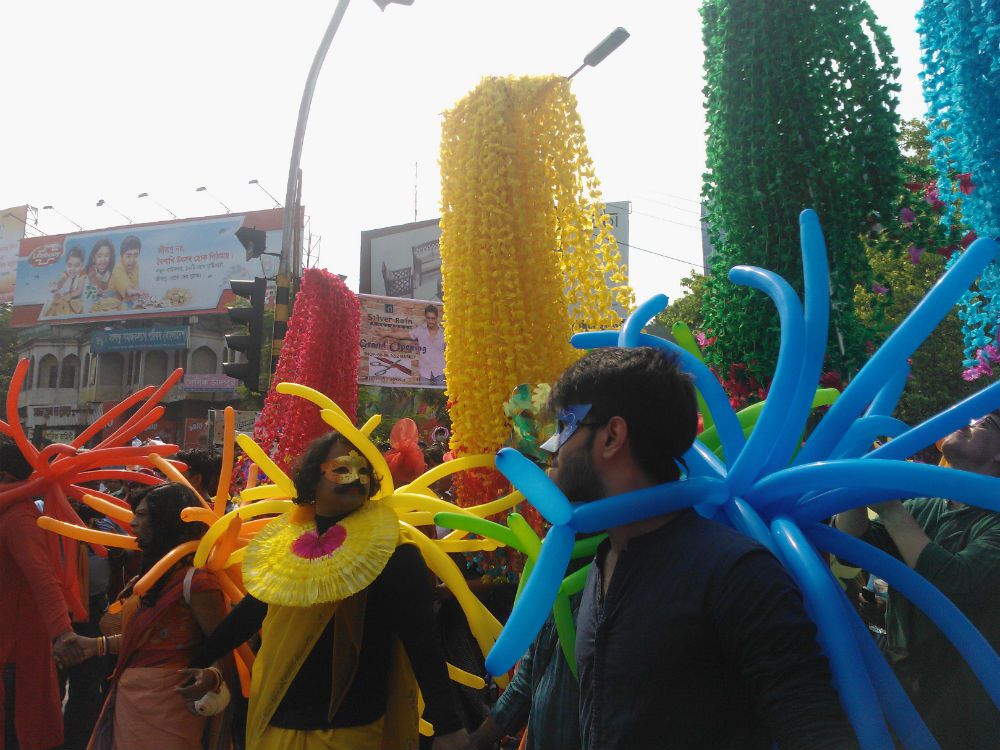

The local LGBT community participating in a rainbow parade to celebrate the Bangla New Year. Credit: Nahid Sultan via Wikimedia Commons. CC BY-SA 4.0
Just over a year ago, Xulhaz Mannan, the editor of Bangladesh’s first LGBT magazine, and LGBT activist Mahbub Rabbi Tonoy were hacked to death in Bangladesh’s capital Dhaka.
On April 25, 2016, they joined the long list of secular thinkers and religious minorities who have been murdered in Bangladesh since 2013.
Ansar al-Islam Bangladesh (Al-Qaeda in the Indian Subcontinent) claimed responsibility for their murders in a tweet. The police have so far arrested two people in connection with the murders, but more than a year after the killings, investigators still have not issued charges against them.
Advocates in South Asia and around the world contended that Mannan was a clear target for Islamist extremists because of the continued criminalisation of homosexual relations and intolerance toward the LGBT community in Bangladesh. The Bangladesh penal code article 377 criminalises sexual activities “against the order of nature,” including consensual homosexual acts such as fellatio and anal penetration, with the most severe possible punishment being life in prison. The provision was introduced by British colonial authorities in the 19th century and was used as the model for sodomy laws in many other British colonies.
On the first anniversary of the killings, Boys of Bangladesh, the largest network of self-identified Bangladeshi gay men from home and abroad, launched a Bangla-language blog called Dhee to commemorate the victims and raise awareness of the plight of the LGBT community in the conservative Muslim-majority nation.
The literal meaning of “Dhee” in Bangla is talent or intelligence. The blog is part of a larger advocacy project for lesbians which includes a comic strip released in September 2015 that tells ‘The Story of Dhee’, a fictional young lesbian discovering her sexuality. Over the past year, the Dhee project has also hosted awareness events on gender and sexuality in seven towns in Bangladesh.
The blog features pieces by members of the LGBT community remembering Mannan and Tonoy, and explaining the fear they now live with since their deaths. The authors are kept anonymous, and even the email address of the commenters are withheld for safety reasons. A statement on the blog reads:
‘Reality came sinking into my heart like a heavy stone’
Mannan worked as a foreign service national for USAID in Bangladesh and was the co-founder and publisher of Bangladesh’s first LGBT magazine Roopbaan). The magazine was launched in January 2014.
Before the publication, the LGBT movement in Bangladesh was mostly underground and led by a handful of people who connected with each other on social media. Shakhawat Hossain of Boys of Bangladesh wrote on The Wire:
Mannan believed in visibility. All his life he worked to provide a safe space for people to come out and be who they were. He opened up his house, spent all his earnings and dedicated his spare time towards mobilising the community and giving us a sense of belonging. He had a unique way of encouraging us to speak up and be assertive of our rights – of our right to love. How ironical it is for the merchant of love to succumb to such hatred and violence.
Tonoy used his theatre experience to produce and act in various short dramas to spread awareness about LGBT issues.
On the Dhee blog, one anonymous blogger recalled his experience learning of their deaths:
Another blogger wrote about working with Mannan on the LGBT magazine Roopban:
He also wrote how Mannan stood beside him during those trying times:
One person wrote about a recent experience that showed authorities’ negative attitude toward LGBT people:
‘What kind of homeland is this, where there is no place for me?’
Bangladeshi society can be intolerant of LGBT people. A person on the Dhee blog wrote how Tonoy faced trouble at home because of his sexual orientation:
Mannan and Tonoy’s murders struck fear into the heart of Bangladesh’s LGBT community. Many activists have now closed their Facebook accounts and changed phone numbers in an effort to hide their identities for their own safety. A female activist explained on the Dhee blog:
By August 2016, investigators had identified five suspects who they say took part in the killings. The police have arrested two of them, who have since testified under Section 164 of the penal code.
But after more than a year since Mannan and Tonoy’s deaths, police have failed to submit charges despite having made these arrests and having stated that they “are quite sure who did it.” The court has granted them 12 extensions since the arrests. Most recently, the report and the charge sheet of the investigation were supposed to have been submitted on May 8, 2017, but the date has once again been postponed. The new submission has been rescheduled for June 6, 2017.
This article was originally published on Global Voices.
Copyright © All right reserved to pahichan.com Site By: Sobij.